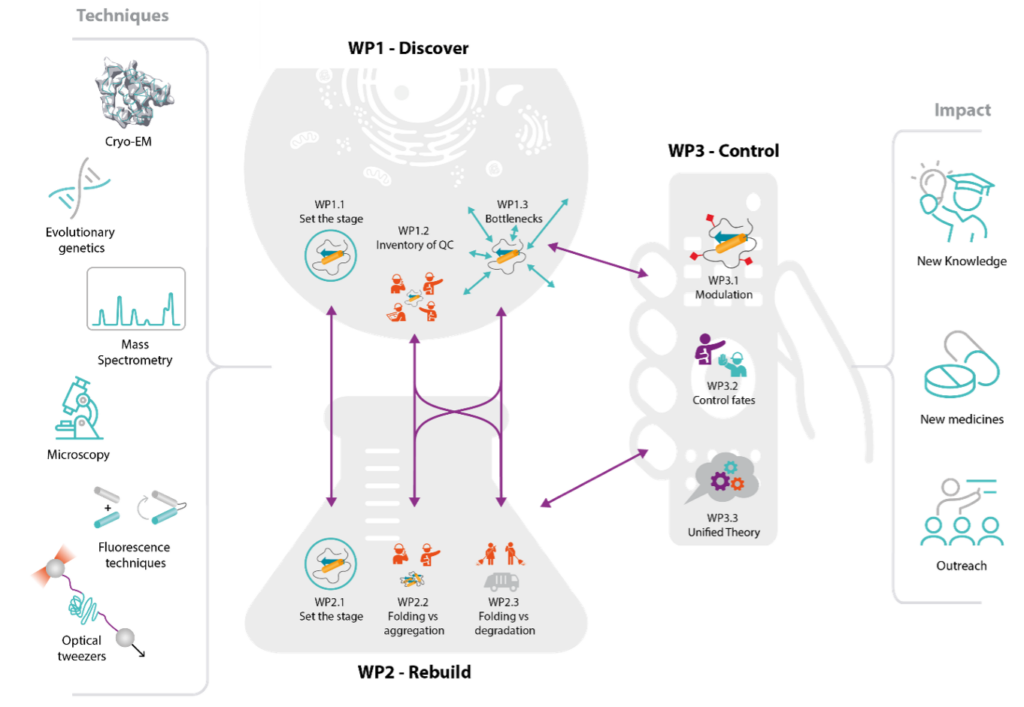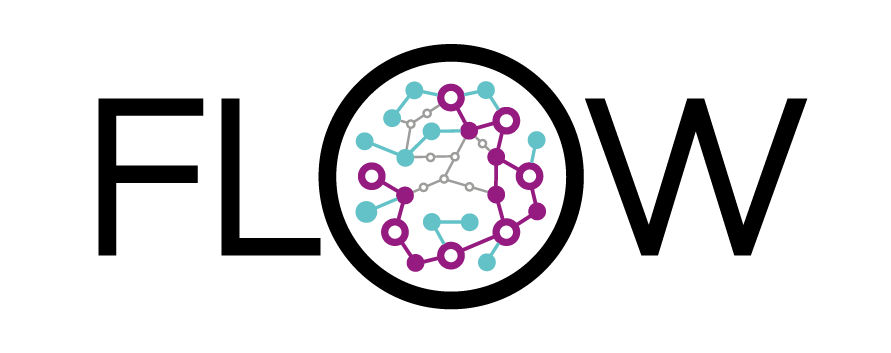Join the 23-M€ Zwaartekracht research consortium FLOW – Protein Quality for Health. FLOW aims to uncover completely the molecular principles how the intrinsic cellular protein quality-control network modulates the trajectory of 2 human disease proteins CFTR (loss of function) and a-synuclein (gain of toxicity) from cradle to grave. To meet this goal, the FLOW consortium –a unique, diverse, and highly interdisciplinary team– will combine biochemical, biophysical, cell biological, computational, and genetic methods, from computation and single molecule to cell. Check our job opportunities page for current vacancies.
Project FLOW
To acquire the complete understanding of protein quality control (QC) and modulate it towards protein and cell health, FLOW focuses on two dissimilar QC-‘client’ proteins, CFTR and α-synuclein. Loss of CFTR function causes cystic fibrosis, and α-synuclein aggregation causes a gain of toxic function in Parkinson’s and related synucleinopathies).
FLOW is designed as three heavily interconnected workpackages. While some projects put more emphasis on a specific workpackage, we expect all applicants to contribute to all of them and to both CFTR and α-synuclein. In FLOW WP 1 “Discover” we will establish all fates and interactors of both clients and the interactor’s effects on clients fates and on cells. FLOW WP 2 “Rebuild” zooms in on the molecular details of client triage by the QC system through reconstitution of network nodes. In FLOW WP 3 “Control”we then will integrate this knowledge to control the QC network towards health.

Work Package 1: Discover
This workpackage aims at understanding the QC network, by identifying the fates and interactions of the two model proteins in cells. FLOW will focus on uncovering the full traffic map for these two at every step of their journey in cells, which starts with synthesis and release from the ribosome, then to intermediate folding, fully native folding, or to misfolding, leading to degradation and/or aggregation. FLOW will chart the cellular QC network with spatiotemporal resolution, including chaperones, co-chaperones, other interaction partners, and post-translational modifications encountered by these proteins during their journeys. Overall goal of FLOW is to exploit this QC network to ultimately obtain full control of the fates of these proteins in cells. FLOW intends to reach such depth of understanding of this journey that it will allow steering of each protein’s fate, leading to fully balanced proteomes required for optimal functioning of cells, preventing proteinopathies.
Work Package 2: Rebuild
This workpackage aims at understanding the QC network at a molecular level, by reconstituting and modulating key steps from purified and well-defined components. FLOW will focus on understanding the decision-making processes within the cellular protein-QC network, which includes the chaperone machinery, ubiquitin-proteasome system, and autophagy machinery. By reconstituting key pathways and controlling the composition of QC machinery and substrates, we will explore the mechanisms that direct proteins towards refolding, disaggregation, or degradation. We will do this at high resolution and at the molecular level. We will examine the roles of post-translational modifications, (co-)chaperones, and client-specific factors in these processes. Goal of FLOW is to build minimal systems that can efficiently manage misfolded or aggregated CTFR and/or α-synuclein, by identifying essential and redundant components, interdependencies, and hierarchical decision-making events. We will also investigate, e.g. by drugs, how the cell influences these decisions and seeks ways to manipulate them for optimal cell and organism health. FLOW ultimately aims to generalize the findings to control the fate of all proteins, thereby improving overall cellular health.
